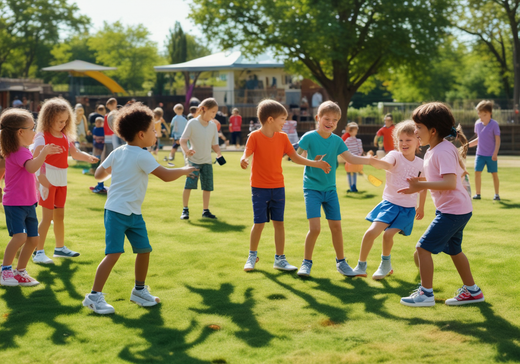Key Highlights
- Physical games and games without screens are important for a child's overall growth.
- These games help with physical health, thinking skills, and emotional well-being.
- Playing outside makes kids more active and helps lower the chance of obesity.
- Board games and puzzles improve thinking, solving problems, and making choices.
- By cutting down on screen time and including these games, parents and teachers can help a child grow better.
Introduction
In today's world, kids spend a lot of time on screens. Many people forget how important physical and screen-free games are for their growth. Playing these games helps kids stay active. It also boosts their thinking skills, social interactions, and feelings. This blog post will look at the many benefits of adding physical and screen-free games to a child's daily life. We will focus on how these games support overall development through design thinking and creative play.
The Role of Physical Games in Child Development

Physical games are very important for a child's growth and development. They help create a strong base for a healthy and active lifestyle. When children run in the park or play tag with friends, they enjoy many benefits for their body and mind. Playing these games helps them gain coordination, balance, and motor skills. This type of physical activity is not only good for their health but also helps with their learning and social skills.
How does playing games contribute to a child's cognitive development?
Playing games helps develop a child's cognitive skills by improving memory, critical thinking, and problem-solving abilities. It also enhances concentration and coordination while promoting creativity and social interaction in a fun and engaging way.
What role do games play in improving a child's problem-solving skills?
Games enhance a child's problem-solving skills by encouraging strategic thinking, decision-making, and creativity in a fun and engaging way. Through game challenges, children develop critical thinking abilities, learn to analyze situations, and become more adept at finding solutions independently.
Boosting Physical Health and Agility
It is clear that physical games help kids stay healthy and active. When children play and move around, like running, jumping, and throwing, they get stronger muscles. They also improve their heart health and fitness. Moving around regularly burns calories, which helps stop childhood obesity. On top of that, physical games make endorphins, which are good for mood. This means kids feel less stress and anxiety. They also feel happier.
Enhancing Social Skills Through Group Activities
Playing physical games, especially in groups, helps kids build important soft skills. When children play together, they learn to work as a team, talk to each other, and figure out rules and roles. Teamwork is a big part of their games, which helps them work together and feel sportsmanship. By playing, kids gain useful life skills. They learn how to solve conflicts, be empathetic, and respect others.
The Impact of Screen-Free Games on Cognitive Skills

Physical games are very important. However, the mental benefits of screen-free games are just as important. Screen-free games like board games, puzzles, and card games get kids involved in ways that video games can't always do. These games help develop critical thinking, problem-solving skills, and smart planning. They support brain growth while being fun and engaging.
Stimulating Creativity and Imagination
Screen-free games help kids think differently and find new solutions. This is especially true for games that let them build, create, or tell stories. When kids play these games, they use their imagination. This boosts their creative thinking skills.
For example, a game with building blocks is great. Kids can try out different shapes and sizes. They turn their ideas into real creations. This design thinking process gets their imagination going. It also improves their ability to solve problems and understand spaces better.
Encouraging Problem-Solving and Decision-Making
Many games that do not involve screens give kids challenges that help them think and make good choices. These games need kids to use their logic, notice patterns, and plan for the future. Chess is a good example of a classic game where kids need to think ahead and guess what their opponent will do. Playing chess helps kids focus, plan, and make smart choices. Puzzle games, like jigsaw puzzles and Sudoku, also need children to solve problems, think about space, and use logic.
Conclusion
In conclusion, choosing physical and screen-free games is very important for a child's growth. Physical games help with health, social skills, and agility. Screen-free games improve creativity, problem-solving, and decision-making skills. By mixing both types of games, parents and caregivers can support their child's overall growth. Encouraging these fun activities helps kids develop important skills they need for the future. Let’s work together to create a positive environment that supports child development through enjoyable and helpful games.
Frequently Asked Questions
What are the best physical games for child development?
Some great physical games for child development are outdoor games like tag, hide-and-seek, and red rover. These games help kids run, jump, and play together. This is good for physical activity and getting them moving.
How do screen-free games improve cognitive skills?
Screen-free games, such as chess, puzzle games, and board games, can greatly boost your thinking skills. When you play these games, you can improve your ability to solve problems and plan strategic moves. Plus, they offer a fun way to enjoy childhood without screens.

